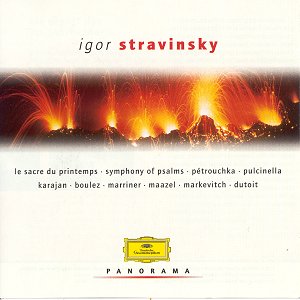Igor STRAVINSKY (1882-1971)
Firebird Suite
Berlin Radio Symphony Orchestra/Lorin Maazel Rec 1958
The Rite of Spring
Berlin Philharmonic Orchestra/Herbert von Karajan Rec 1977
Symphony of Psalms
Russian State Academy Choir and Orchestra/Igor Markevitch Rec 1963
Pulcinella Suite
Academy of St Martin in the Fields/Neville Marriner Rec 1968
Concerto in E flat: Dumbarton Oaks
Ensemble Intercontemporain/Pierre Boulez Rec 1982
Petrushka (1911 version)
London Symphony Orchestra/Charles Dutoit Rec 1977
Circus Polka
Berlin Philharmonic Orchestra/Herbert von Karajan Rec 1972
 DEUTSCHE GRAMMOPHON Panorama
469 205 2 [2 discs; 74.54 & 77.39]
DEUTSCHE GRAMMOPHON Panorama
469 205 2 [2 discs; 74.54 & 77.39]
Crotchet
AmazonUK
AmazonUS

This is excellent value, both financially and artistically. This well-filled
pair of CDs contains a wealth of top quality material from DG's back catalogue,
with sound that has emerged from its latest remastering very satisfactorily.
The earliest of these Stravinsky performances is by a conductor who is still
very much at the centre of musical life, having recently been appointed Principal
Conductor of the New York Philharmonic. Lorin Maazel made some very fine
recordings as a young man, none of them finer, in fact, than this 1958
Firebird Suite. The Berlin Radio Symphony Orchestra is on excellent
form, yielding nothing to their more famous counterparts, the Philharmonic.
The sound is warm and atmospheric, allowing the subtlety and romantic feeling
of the score to communicate particularly well.
Stravinsky said that he found Karajan's interpretation of The Rite of
Spring 'too mild mannered'. But he was referring to the conductor's earlier
1966 version; this 1977 version is tighter and more explosive, and the sound
is suitable firm-edged. The drama is nothing if not compelling.
Markevitch's Russian performance of the Symphony of Psalms has
satisfactory sound but the discipline of the ensemble could be tighter, since
some of the orchestral and choral entries are not quite together. Like most
performances, this is by a mixed chorus, with women rather than the boys
Stravinsky preferred. The vibrancy and expressiveness of Markevitch's conception,
however, more than compensates for any drawbacks in the ensemble.
Neville Marriner and the Academy of St Martin in the Fields have made many
recordings together, but few can match their 1968 Pulcinella Suite.
For this is a vintage performance, beautifully recorded and featuring peerless
playing. The tempi are well chosen throughout, never seeming forced., and
with a chamber orchestra individual instrumental details are always brought
into sharp focus.
Top quality playing is also a feature of the Ensemble Intercontemporain and
Boulez, in the Dumbarton Oaks Concerto. The textures emerge with great
clarity, but the tempi do not seem as natural as they might, pushing things
to extremes somewhat. But this is a matter if interpretation, and Boulez
makes the most of the music's possibilities for characterisation.
Although the sound is more spectacular skill in his later Montreal version
of Petrushka (for Decca), Dutoit's 1977 performance of
Petrushka with the LSO on top form is still an undoubted winner. He
prefers the original 1911 version with its larger orchestra and richer, more
colourful scoring, and the well-chosen tempi make the music flow at the same
time as revealing the strong contrasts which lie at the heart of this marvellous
work. Seldom have the rhythms danced with greater abandon than this.
The Circus Polka (for a young elephant) is among the most witty of
all orchestral compositions, with displaced rhythms and uproarious orchestration.
Perhaps Karajan is a little polite, though his tempi bring out the lively
edge the music needs and the orchestra is on top form.
Terry Barfoot

